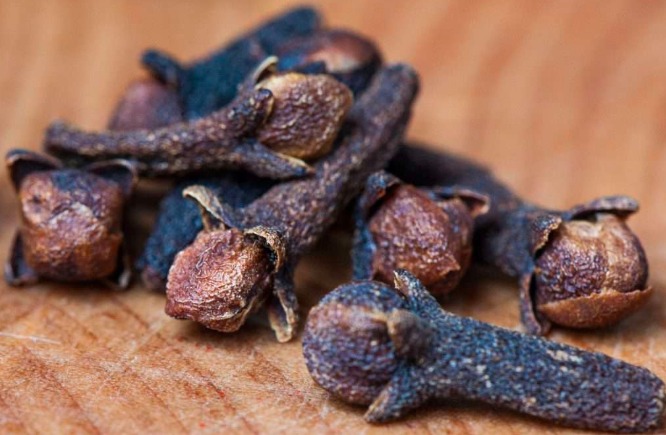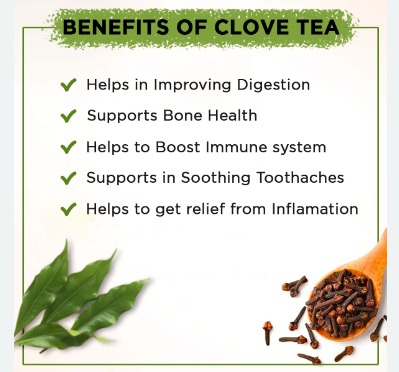Clove, the aromatic spice that adds a burst of flavor to your favorite dishes, has a lot more to offer than just its tantalizing taste. Beyond its culinary uses, cloves have been celebrated for their remarkable health benefits for centuries. In this comprehensive guide, we will delve into the surprising health advantages of cloves that you need to be aware of.

Nature’s Antibiotic
Clove is a natural powerhouse of antibacterial properties. The compound eugenol, found abundantly in it, has been shown to combat various harmful bacteria and microbes. Incorporating cloves into your diet can help boost your immune system and defend your body against infections.
Pain Reliever Extraordinaire
Clove oil has been used traditionally as a potent pain reliever. Its analgesic properties make it effective in alleviating toothaches and headaches. Simply applying a small amount of it to the affected area can provide quick relief from discomfort.
Digestive Aid
If you struggle with digestive issues, it can be your ally. It aids in digestion by promoting the secretion of digestive enzymes. This can help ease indigestion, bloating, and flatulence, allowing you to enjoy your meals without discomfort.
Anti-Inflammatory Wonder
Inflammation is at the root of many chronic diseases. It contain anti-inflammatory compounds that can help reduce inflammation in the body. Regular consumption of it may contribute to the prevention of conditions such as arthritis and cardiovascular diseases.
Blood Sugar Control
Managing blood sugar levels is crucial for those with diabetes or those at risk of developing the condition. It have been shown to have a positive impact on blood sugar control. Including cloves in your diet, in moderation, can be beneficial for stabilizing glucose levels.
Oral Health Champion
Clove’s antibacterial and analgesic properties make it a superstar in the realm of oral health. It not only freshens your breath but also helps prevent dental issues like cavities and gum disease. Chewing on a clove or using clove-infused toothpaste can work wonders for your oral hygiene.
Rich in Antioxidants
Antioxidants are essential for combating oxidative stress and preventing cell damage. It is rich in antioxidants that can help protect your cells from damage caused by free radicals, potentially reducing the risk of chronic diseases.
Respiratory Health Support
Clove’s aromatic properties extend to its ability to support respiratory health. It can help relieve symptoms of respiratory conditions such as coughs and asthma. Inhaling steam infused with it’s oil can provide relief from congestion and respiratory discomfort.
Skin Savior
Clove’s antimicrobial properties make it a valuable addition to your skincare routine. It can help combat acne and other skin issues caused by bacteria. Mixing clove oil with a carrier oil and applying it topically can help clear your skin and promote a healthy complexion.
Stress Buster
Incorporating it into your daily routine can help alleviate stress and anxiety. The soothing aroma of it has a calming effect on the mind and can promote relaxation, making it an excellent choice for aromatherapy.

What Is The Nutritional Profile Of Cloves?
Clove, the aromatic spice derived from the flower buds of the clove tree (Syzygium aromaticum), not only adds flavor to dishes but also provides several essential nutrients. Here’s a breakdown of the nutritional content of cloves per 100 grams:
- Calories: It is relatively low in calories, with approximately 274 calories per 100 grams.
- Carbohydrates: It is primarily composed of carbohydrates, accounting for about 65 grams per 100 grams. These carbohydrates are mainly in the form of dietary fiber.
- Protein: It contain a small amount of protein, roughly 6 grams per 100 grams.
- Fat: It has a minimal amount of fat, about 13 grams per 100 grams, most of which is unsaturated fat.
- Dietary Fiber: It is rich in dietary fiber, with around 21 grams per 100 grams. Dietary fiber is essential for digestive health.
- Vitamins: Cloves are a good source of several vitamins, including:
- Vitamin C: It is one of the richest sources of vitamin C among spices, with about 80 milligrams per 100 grams.
- Vitamin K: They also contain vitamin K, which is important for blood clotting and bone health.
- Minerals: Cloves provide various minerals, such as:
- Potassium: It contain potassium, an essential mineral for maintaining blood pressure and proper muscle function.
- Calcium: They contain a small amount of calcium, important for bone health.
- Magnesium: It also have magnesium, which plays a role in muscle and nerve function.
- Antioxidants: They are known for their high antioxidant content, primarily due to compounds like eugenol. These antioxidants help combat oxidative stress and may have health benefits.
- Essential Oils: It contain essential oils, including eugenol and caryophyllene, which contribute to their aroma and potential health benefits.

Key Takeaways
- They are a storehouse of vital nutrients like manganese, vitamins C and K, and fiber.
- They can be used as part of several natural remedies to help fight inflammation and promote bone, eye, and digestive health.
- Cloves can be made into a tea or added as a garnish for cakes and rice dishes.
- Overconsumption of it may increase the risk of bleeding and allergies.
It’s important to note that while cloves are nutritious, they are often used in small quantities in recipes due to their strong flavor. Incorporating cloves into your diet can contribute to your overall nutrient intake and provide potential health benefits. However, it’s advisable to use them in moderation to avoid overpowering the taste of dishes.
Check out more at healthylifehacks101.com

